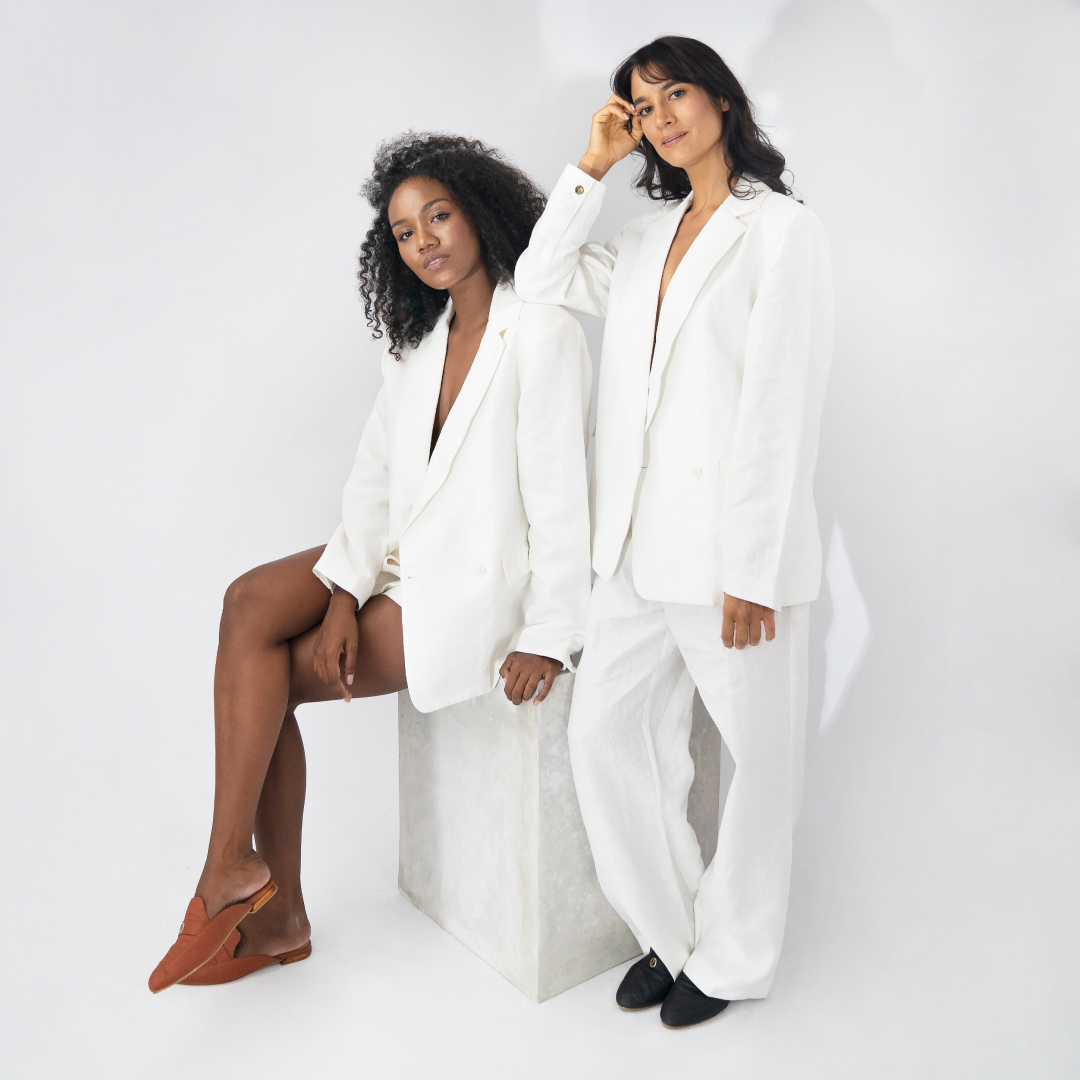Asking Questions Throughout Fashion Revolution Week & Earth Day 2022
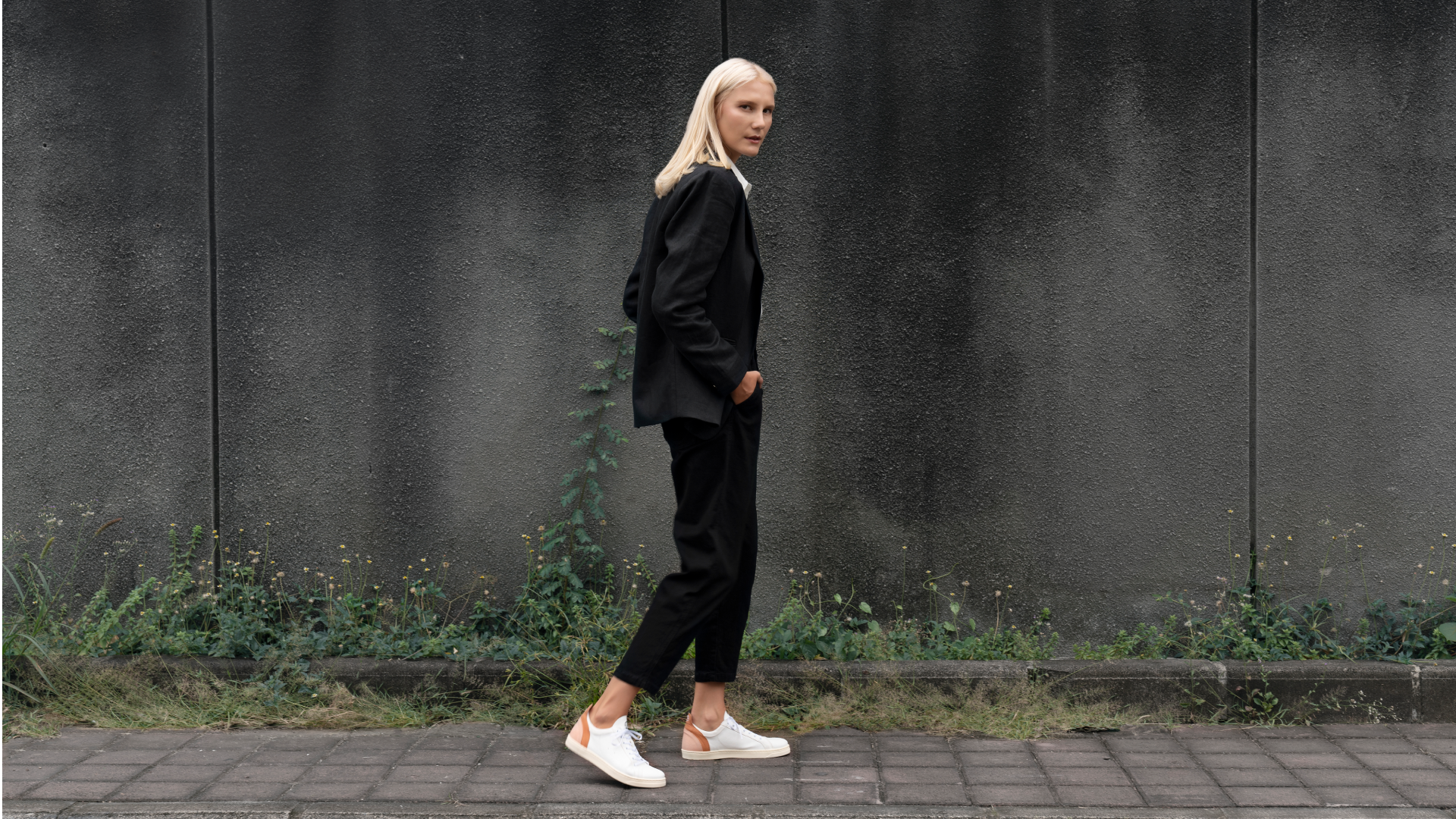
Toward the end of April, we have two main agenda to cover—Fashion Revolution Week and Earth Day. This year, Fashion Revolution Week is set to take place from Monday the 18th to Sunday the 24th of April; meanwhilst, we celebrate Earth Day annually on the 22nd of April.
Fashion Revolution Week is an annual event that raises awareness of the Rana Plaza Collapse, which took place on 24 April, 2013. The event is an activist campaign that aims to bring global attention to the horrifying incident of Rana Plaza, a building in Bangladesh used to house garment factories and local workers—the most prominent scene for fast fashion to ever take place. The collapse of the building could have been prevented if higher ups would listen to complaints from workers, who had informed of the building’s poor and dilapidating state. Alas, the management turned a blind eye, allowing the building to fall into ruins, resulting in the deaths of more than 1,100 young women and another 2,500 injured workers. According to the Fashion Revolution organisation, this event is the fourth largest industrial disaster in history.
Ever since the event, local teams around the world, belonging to the larger Fashion Revolution collective, are dedicated to criticising fast fashion and calling out brands who still exploit their workers and Earth’s resources for profit gains over fair trade and sustainability. The initiatives of Fashion Revolution Week come at a time when campaigns and movements of sustainability are much needed, especially in light of Earth Day and Earth Month at large which all take place in the month of April. After all, when talking about sustainable fashion, we can’t leave out conversations about living wages and fair working conditions of the workers, too.
The fashion industry is one of the biggest polluters, contributing to over eight to ten percent of the global greenhouse gas emissions. So, asking the right questions about how our clothes get made is exactly what we should do during Fashion Revolution Week. There are two main hashtags to note throughout the campaign: #WhoMadeMyClothes & #WhatsInMyClothes. Let’s explore what these hashtags entail in the sections below.
Questions you should ask during Fashion Revolution
The first hashtag #WhoMadeMyClothes is a nod to the Rana Plaza collapse, inviting people around the world to question how their clothes are made and by who. So the question to ask is: Does the person who made my clothes make a living wage? By asking this question, we make ourselves conscious of our purchase power and decisions, and in turn become more considerate of the people involved in garment production instead of thinking about big businessmen behind the brand. The fact is many global fashion brands outsource their production to workers in low-income countries with very poor conditions to work with—normally observed in developing countries—to cut down on costs. So, it’s worth questioning and noting down the working conditions of garment workers to learn whether the money we spend goes into the right pockets.
In line with the Sustainable Development Goals (SDGs), Goal 8 demands for Decent Work and Economic Growth of businesses. In other words, employees must not be taken advantage of and must be provided with fair conditions and compensations for their hard work.
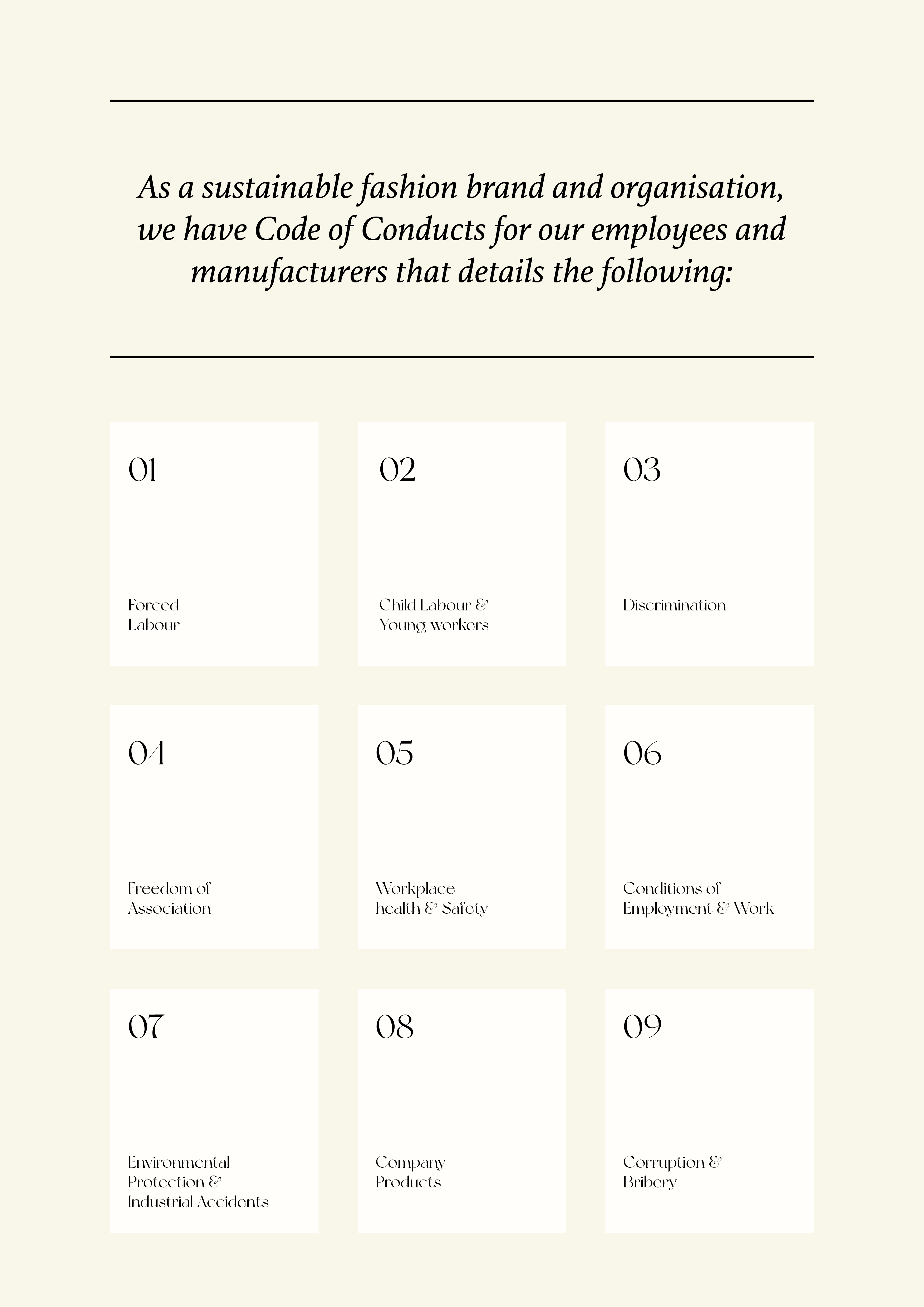
The comfortable and beneficial working conditions will, after all, be a benefit for the planet as carbon footprints can be controlled and minimised to lessen the damaging effects on the environment. So, yes, fair trade does have an effect on sustainability.
Goal 12 of the SDGs, Responsible Consumption and Production, can be connected to the focus on ecological footprints. For instance, to meet this requirement at 1 People, we only use materials that are eco-friendly and sustainable, and think about a product’s life cycle from start to finish. We always consider the implication of our designs on the environment. Our manufacturers have environmental and social management standards, including ISO 14001-2015, which states that they follow an environmental management system to enhance their environmental performance. Additionally, we also sort and recycle our wastes to the respective organisation and facilities. For more information, we provide more details on Our Impact page.
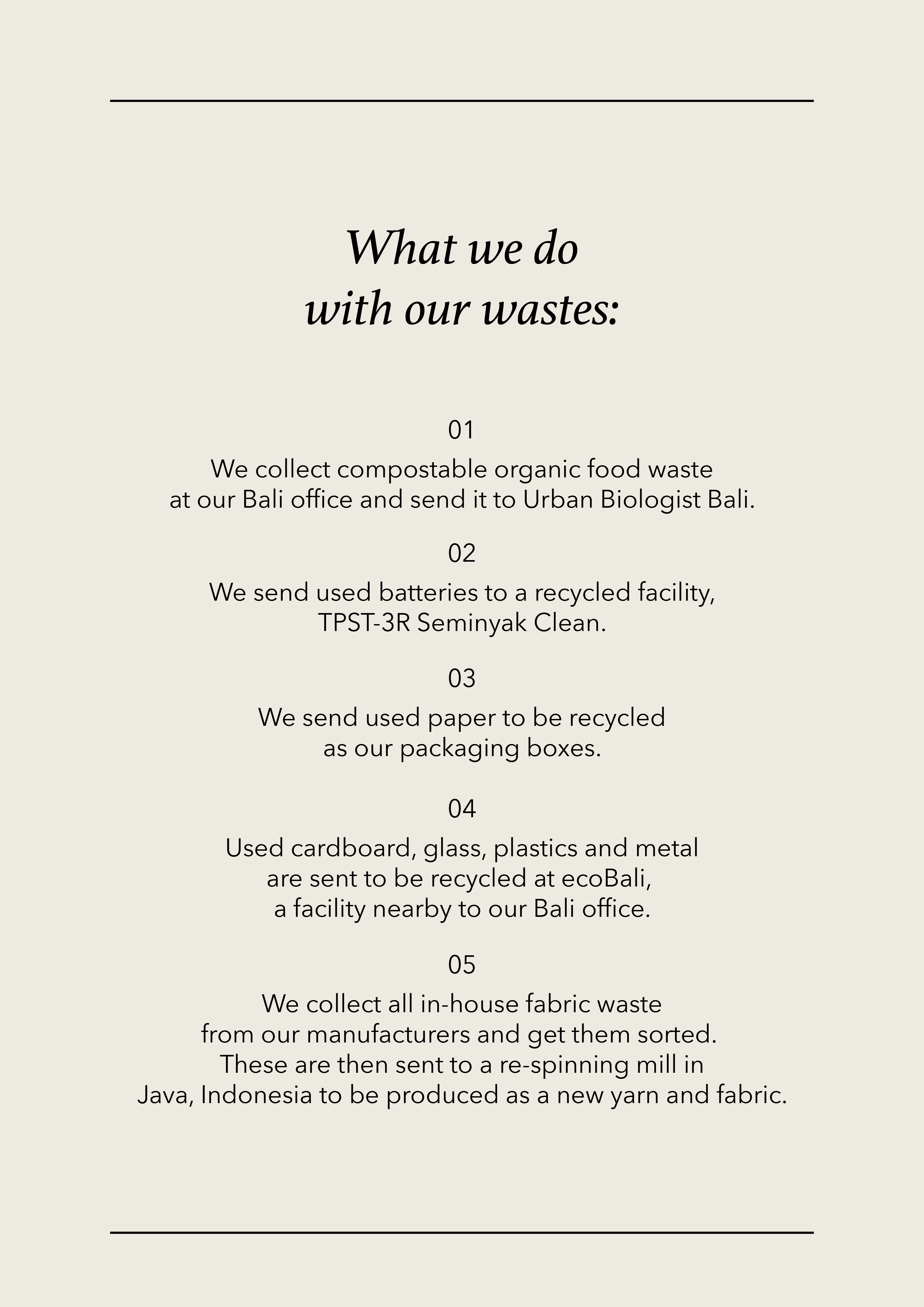
Earth Month places a focus on the impacts that we as humans on the local, national and even international levels are contributing to the environment. The SDGs act as guidance for a peaceful and prosperous people and planet for the present and future. Meeting the expectations set forth by the SDGs is therefore a great way to start outlining whether our actions are headed in the right direction for optimal development in consideration of humanitarian and environmental factors. We want a healthy planet to live in, but we must take part in contributing to its condition.
The last point connects well with the second hashtag that Fashion Revolution Week promotes. #WhatsInMyClothes begs the question: What would the world look like if brands restored systems instead of depleting them? The world works in circular ways. We need to take in order to give, but we must do so responsibly. This is what consumers demand of businesses—we need their products and/or services, but in order to be provided with such they also require resources. Nowadays, business models must meet certain standards wherein socio-environmental responsibility is a crucial part to consider. More and more, the need for a circular business model is being sought after and favoured by consumers who are demanding transparency in brands. Take the food industry, Supply Chain Brain mentions that transparency by food brands will result in loyalty in 94% of consumers—this data is based on a report. For the sustainable fashion industry, radical transparency or honest marketing is what consumers demand of brands.
The facts and statistics are all there. The fashion industry is contributing to deforestation for grazing, leading to desertification and soil degradation and loss of biodiversity. Moreover, it takes 13,000 litres of water to produce just one kilogram of virgin cotton—this is equivalent to the weight of a shirt and pair of jeans. Producing polyester with petroleum is exhausting natural resources and results in 2 million tons of microfibres entering oceans. In the end, this all connects well with Goal 12: Responsible Consumption and Production, where we consider the impacts of our decisions and actions from start to end.
Another question to reflect on during Fashion Revolution Week is the following: How much did you pay for *insert favourite clothing item here*? And how much is it worth to you? Statistics have shown that garments are worn only seven to ten times before being tossed. So, take a look at your wardrobe and reflect on the garments you like to wear. How many times have you worn it? How much does it mean to you? How much did you have to pay for it? When making a clothing purchase, we can determine how sustainable it is by first asking ourselves, ‘Do I really need to make this purchase? If so, will it match any of my other garments?’. From there, you can determine just how much the clothing purchase can mean to you.
At 1 People, we provide capsule collections that have been designed to be loved by you for many, many years. This can be seen from quality, which is indicative of Scandinavian fashion standards, as well as design whereby its minimalist nature can be mixed and matched with any of your existing garments. We also believe in attaching a certain sentimental value to your clothing, which is why we aim to do just that with our design and pieces. By communicating how our clothes are made, with what fabric, and generally the design and sustainability aspects, we hope to encourage certain lovable values to your purchase.
Our manufacturing partners
Manufacturers take centre stage during Fashion Revolution Week. Last year, we highlighted some of our manufacturers in Indonesia.
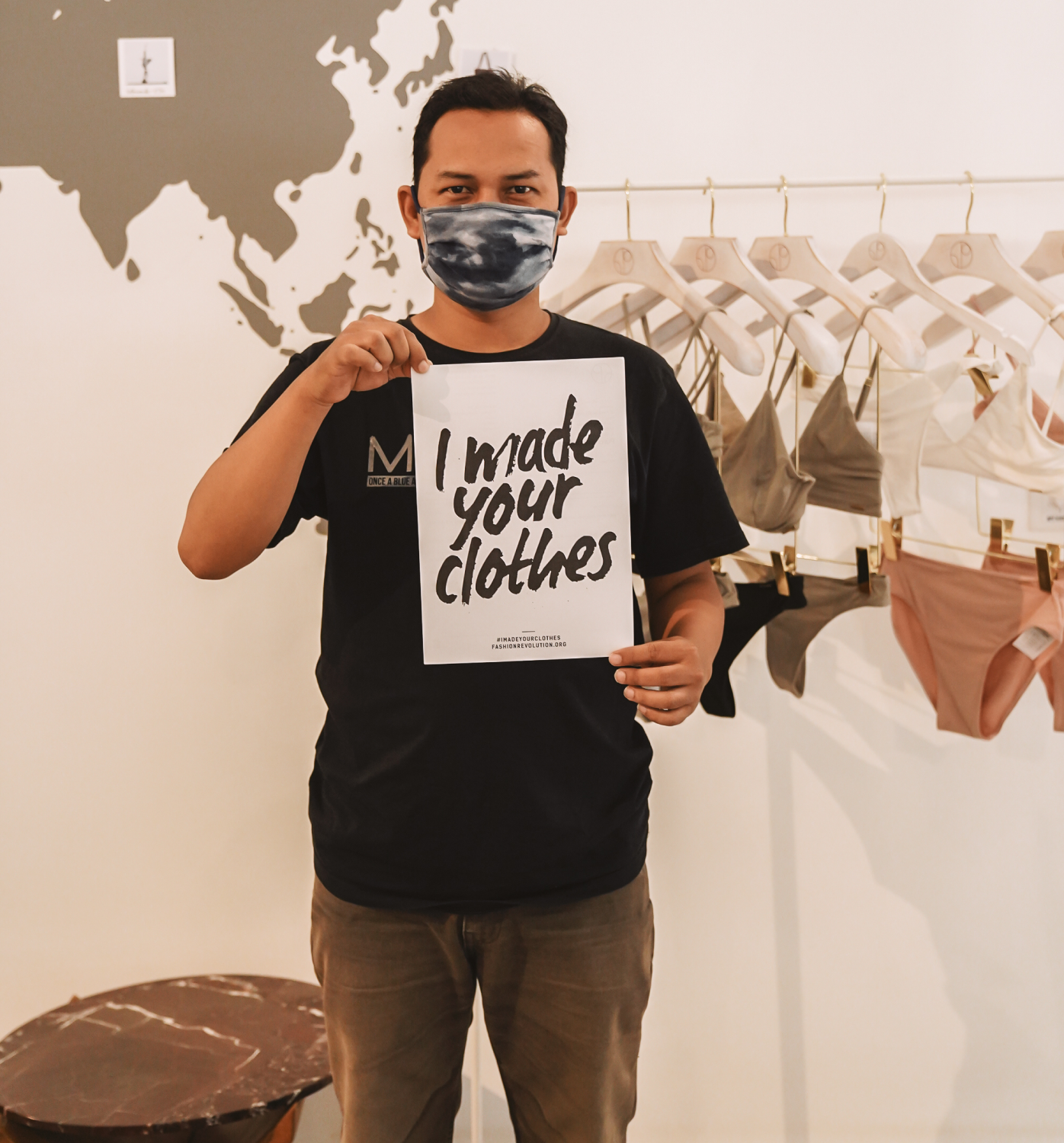
We also took some time to chat with our bag artisan, the hero behind our Piñatex® bag collection. Get to know Mr. Kiki by watching the video on our YouTube here. We have worked with a range of partners, from artisans and small-scale manufacturers to mid-sized textile companies that provide us with innovative fabrics, such as PYRATEX® and VEGEA. Before working with our manufacturers, we always consider whether they have standards and certifications in place, a fair working environment, willingness to work with innovative fabrics, and whether sustainability is part of their values. As mentioned before, we have a Code of Conduct for our manufacturers to ensure that no exploitation occurs.
The location of our manufacturers are not limited to just one. We work with manufacturers in India, Indonesia, Portugal and Mauritius. Our manufacturing partner in India, Creatnet, has social programmes and initiatives of their own that empower women workers and provide skills training. Learning about our partners’ social programmes excites us, because they’re inspirational and gives us a chance to collaborate on developing that into something bigger together. For more information on our manufacturers, you can visit our page here.
How you can support Fashion Revolution Week
Participate in the insightful campaign by following Fashion Revolution Week on Instagram. They also have local teams all over the region, from Denmark, Singapore, Japan, Indonesia and more! You can also share your answers to the above questions on social media and get the conversation going. Share with us by tagging us on social media (@1peopletogether) and use the hashtag #1PeopleTogether #WhoMadeMyClothes #WhatsInMyClothes. We can’t wait to hear about your conscious fashion journeys!
Much Love,
1 People







